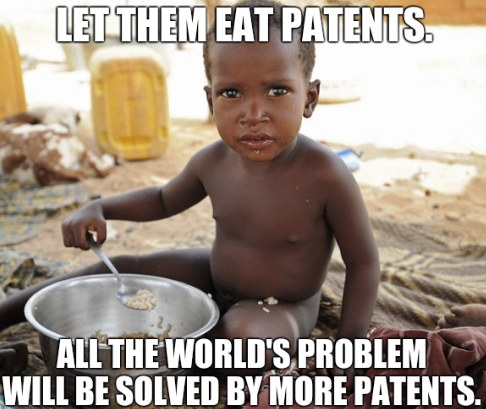

THE PUSHESR of what's called "stronger" (or STRONGER) "patent act" in the US don't care about the strength of patents. They care about the contrary and push for the very opposite. They just want the U.S. Patent and Trademark Office (USPTO) to grant loads of software patents that courts reject anyway.
"In practice, however, they merely grant monopolies in technology that can reduce pollution."The same is true for the European Patent Office (EPO), where António Campinos -- like Battistelli before him -- measures 'strength' in terms of so-called 'productivity'. Not quality, not examiners' skills, not validity rates (or rates of European Patents being upheld by courts). It's hardly surprising that Campinos shamelessly lobbies for software patents in Europe. That helps him fake 'production'...
In order to pretend that the EPC does not exist (like 35 U.S.C. ۤ 101 in the US) they resort to misleading, novelty-sounding buzzwords such as "hey hi" (AI). To deny patents on this "hey hi" would surely be a denial of progress and amazing novelty, right? The media speaks about "hey hi" day and night, especially more so since 2017 or thereabouts (it boils down to superficial, faked hype).
Another pattern of EPO propaganda has recently been greenwashing. They pretend that their patents somehow "save the planet..." (no, they seriously try to imply that!)
In practice, however, they merely grant monopolies in technology that can reduce pollution. As we mentioned in an earlier post of ours, there's a new example of this which is promoted in a misleading fashion. For instance, the article "SeaTwirl Granted European Patent" (from North American Windpower) says: "SeaTwirl, a producer of floating wind turbines, will be granted a patent for a divisible wind turbine by the European Patent Office (EPO). SeaTwirl has already been granted the same patent in Sweden, the U.S. and China. [...] SeaTwirl is working strategically to build a broad patent portfolio. By protecting technical solutions that make the wind turbines cheaper to build and maintain, the company strengthens its market position, notes SeaTwirl."
How does a monopoly make things cheaper? The opposite is true. But never let "green" stunts slip away, right?
The National Law Review has just published this new piece from a giant law firm (Mintz, Levin, Cohn, Ferris, Glovsky and Popeo, P.C). The piece mentions the EPO's position on so-called 'AI' patents and notes that "IEEE-USA urged the USPTO to focus on correcting the problems facing all computer implemented technologies as a primary approach to providing strong patent protections to AI based inventions."
Well, IEEE is at least consistent in his anti-software developers stance. We've long warned about IEEE pushing illegal software patents and it seems rather clear that IEEE does not represent engineers. Here are some portions: (it's about input sent to the US patent office)
The European Patent Office (EPO) has refused two European patent applications that designated an artificial intelligence called DABUS as the inventor, following a non-public hearing on November 25, 2019. The EPO has not yet published its reasons for refusing the applications but merely stated that “they do not meet the requirement of the European Patent Convention (EPC) that an inventor designated in the application has to be a human being, not a machine.” The refusal refers to Article 81 and Rule 19 of the EPC. The EPO further noted “A reasoned decision may be expected in January 2020.”
[...]
Institute of Electrical and Electronics Engineers (IEEE-USA): IEEE-USA urged the USPTO to focus on correcting the problems facing all computer implemented technologies as a primary approach to providing strong patent protections to AI based inventions. IEEE suggested looking to other areas of IP law for models as it relates to inventorship. For example, the IEEE cited Naruto v. Slater (“monkey selfie case”) which denied a monkey copyright authorship of a selfie taken by the monkey. The rulings were based in part on the constitutional authorization to reward human authors and inventors. Accordingly, the IEEE also believes that AI cannot be inventors.